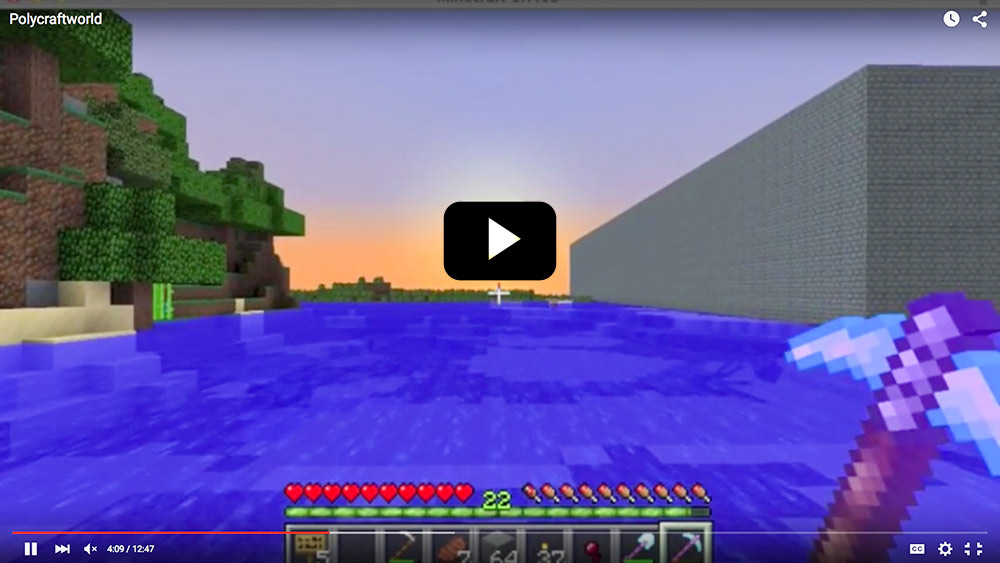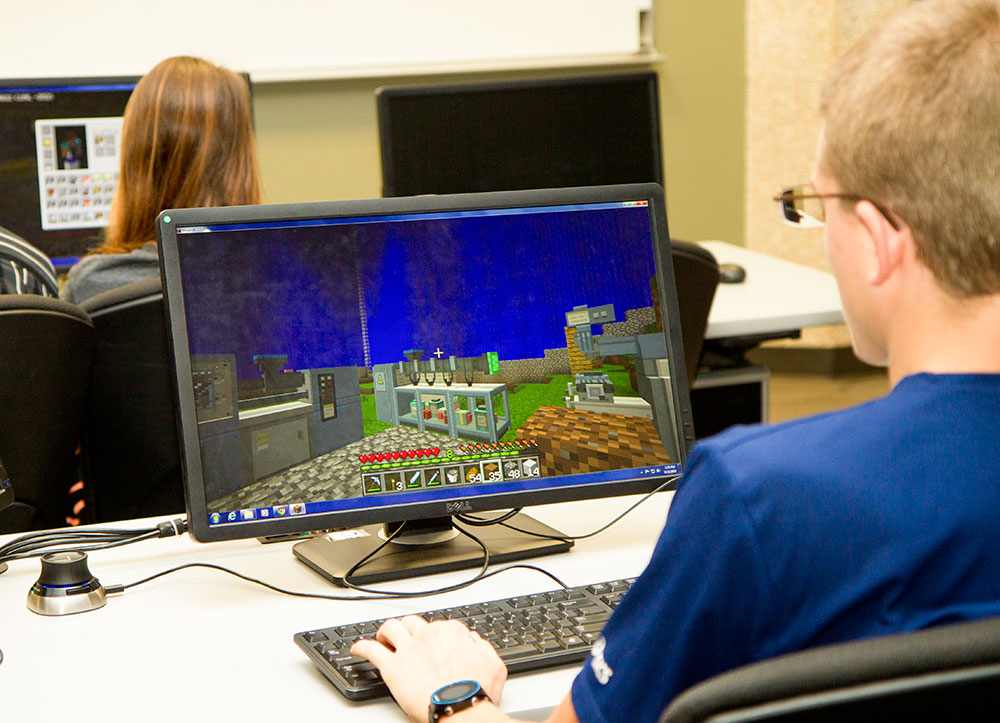
Get in the game and win a scholarship. Each week the team behind “Polycraft World” is unveiling new challenges in which UT Dallas students and future students can compete for $5,000 scholarships. The challenges can be found on the game’s YouTube channel. Learn more about the competitions in the video above.
Video games are not just for fun anymore. By winning weekly challenges on a UT Dallas-developed game, students can earn scholarships to attend the University.
Last year, a team of faculty, students and alumni launched “Polycraft World,” one of the most comprehensive modifications, or mods, available for the popular video game “Minecraft.” Earlier this year, access to servers hosting the beta version of the mod was free for the first 10,000 users.
The team, led by assistant professor Dr. Walter Voit BS’05, MS’06, who teaches in the Erik Jonsson School of Engineering and Computer Science, is calling on students to showcase their skills.
Each week, new competitions are unveiled on the game’s YouTube channel. Whoever completes the challenge best is named “Polycrafter of the Week” and receives a $5,000 scholarship.
Competitions last 12 weeks each and are open to both current and future UT Dallas students.

It’s not all play in this class. This semester, students are using “Polycraft World” to develop online teaching methods and educational video games that balance fun with learning.
“We may ask users to design the most efficient chemical processing plant within a limited space that produces a certain amount of plastics each hour,” Voit said. “Or, we may challenge students interested in journalism to build a jetpack and fly around the server and publish a weekly newsletter on what’s happening.”
The first competition? Get the most unique visitors to your private property in “Polycraft World” during a timeframe that began Sept. 3 and ends Nov. 26.
“How you attract visitors is up to you. That is the challenge. Share with your friends, family, post videos or tweet to your followers — advertise. We want to see how you spread your message,” Voit said.
With assistant professor of chemistry Dr. Ron Smaldone, Voit is teaching a class to help students develop online teaching methods and educational video games that balance fun with learning. The students are playing “Polycraft World” as a case study.
“We’re treating the class like a startup company,” Voit said. “Students come from different disciplines, and we have tracks in computer science, chemistry, social media and engineering. It will be heavily project-based.”
Voit and Smaldone are using the extensive world of “Minecraft,” hoping to create a unique educational experience for those interested in learning more about science and economics in new ways. Users are encouraged to experiment with and create new tools as they mine, build, refine and grow their communities.
‘Polycraft World’
“Polycraft” is free and available to the public. To play the game, click here.
For full details about scholarship opportunities, click here.
Access more information about the “Minecraft” modification at polycraft.utdallas.edu and instructional videos on YouTube.
“The first thing you can do in ‘Polycraft World’ is collect a polymer — natural rubber,” Smaldone said. “You get it by tapping a tree. You can make bouncy rubber blocks, a pogo stick, things like that. It gets people introduced fairly early on into actual polymer chemistry.”
From there, Smaldone said players can build machines to make rubber grips for tools, which makes the tools already in the game better and last longer.
“There’s pretty advanced chemistry built into the game. If users are dedicated enough, they can fuel their jetpacks, but they have to refine crude oil down to propane first,” he said.
Connor Cone, a junior physics major, is taking the “Polycraft World” course.
“I took AP chemistry in high school, but other than that I didn’t have much background in the subject. I knew a little organic chemistry,” Cone said. “In the game, I’m using real-life processes to make plastics and I understand the science behind it. I own and operate oil refineries. I can tell you how the oil becomes plastic and I can name the chemical formula for polyethylene off the top of my head now.”
Voit said that additions to the game are constant. The team has recently included an electrical engineering component where users can build a clean room.
“We included ways to build silicon wafers and solar cells, and other components that you can use to build solar arrays, walkie-talkies or cellphones. Users can find a better way to communicate and make the game more efficient,” Voit said.
Voit said that as the game grows, users will be able to focus on many aspects, such as electronics, chemistry, economics, agriculture and food or architecture.
